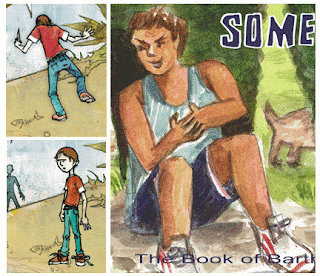Food Fight is a story somewhat like
At the Library. There is not a lot of action in this story, but it helps to string together different story lines and sets things up for the stories to come. Although there isn't much action, there is still much I like about this story. Claire really starts to change as a character. Her spoken word classes have helped her to be more outspoken. She has always been a bit abrupt, but now she is sharing ideas and helping Bartholomew to think bigger than just his garden. She is also concerned about Charlotte not being a mope-bot (yes, that is a robot that mopes - whatever that means). She lets Charlotte know this in her own style.
Charlotte in the meantime is struggling. She didn't realize how much she would miss Topping when she broke up with him. Being newly single can be hard.
And Bartholomew, well, he starts out the story not knowing what to do, but by the end there is a plan of action.
Yes, Claire is ready for a fight, preferably a personal fight with Mayor Dick. But we will see what happens in the next few stories as Bartholomew and his family and friends decide to take on City Hall to protect their garden.
Here is an excerpt from
Food Fight, to be published on April 20, 2012:
“Ooh, I wish I could punch Mayor Dick right in the face,” seethed Claire as she finished reading the garden eviction notice.
“What are you going to do?” asked Charlotte.
“I don't know yet,” answered Bartholomew. “Aunt Josephine wants to fight it. She says that land just sits there empty, and there's no reason why we shouldn't be able to garden on it.”
“She's right,” said Claire.
“But then if we can't plant on the railroad property, too, the garden isn't very big,” said Bartholomew.
“Isn't very big?!” exclaimed Claire. “Bartholomew, it is still plenty big for us. It was quite a bit of maintenance to keep it going. I can't imagine what we were going to do at harvest time.”
“Yeah, a lot of mine and... Topping's... food went to waste because we couldn't eat it all,” said Charlotte holding back her sadness at the mention of their old life together.
“Well, you don't have to worry about that now that I'm cooking as much of it as possible so it doesn't go to waste,” responded Claire.
“How's the new apartment?” asked Bartholomew.
“It's good,” said Claire. “Much nicer not having old Dumbo Ned around. Charlotte is a much better roommate.”
“Yeah,” agreed Charlotte with a forced smile.
“But Bartholomew, I think you are looking at this garden permission thing all wrong,” said Claire. “It's not just about this garden of ours, but the city should have a policy that allows community gardens all over the place. Everybody should have the right to a space to grow their own food. It's the sustainable thing to do. There's only one community garden in town and that's run by a church and the food is given to a food shelf.”
“Really, I hadn't even thought about other gardens, or the possibility of them,” said Bartholomew. “You guys want something to drink?”
“How about a gin and tonic?” asked Charlotte.
Bartholomew, who was heading toward the kitchen, stopped in his tracks. “Charlotte, I meant orange juice or water or coffee. It is only ten in the morning.”
“Oh...” said Charlotte, turning a little red. “Yeah, of course...” She let out a little laugh. “I'm just joking. I would like some orange juice if you have it, please.”
“I'll have some coffee, if it’s not a bother,” said Claire. “Otherwise, I'll have some juice, too.”
“Two juices it is,” said Bartholomew as he disappeared into the kitchen.
Alone for a few moments, Claire leaned over to Charlotte and asked “I have an extra ticket to the poetry slam tonight, do you want to go? 'Rissa is putting it on and some of the people from my class are going to perform. It's a fundraiser for a local battered women's shelter.”
“Oh, I don't know. I think spoken word in support of a women's shelter might be a bit depressing.”
“What do you mean?!” demanded Claire.
Charlotte suddenly felt bad about what she had said. “It's just that 'Rissa will start talking about her experience and about blood and bruises and … well... it’s kinda depressing. Don't get me wrong, it’s a good cause. I just don't think that's what I'm in the mood to hear tonight.”
“Fine. But these are my friends. It would be nice for you to get out and meet people instead of moping around the apartment every night.”




























